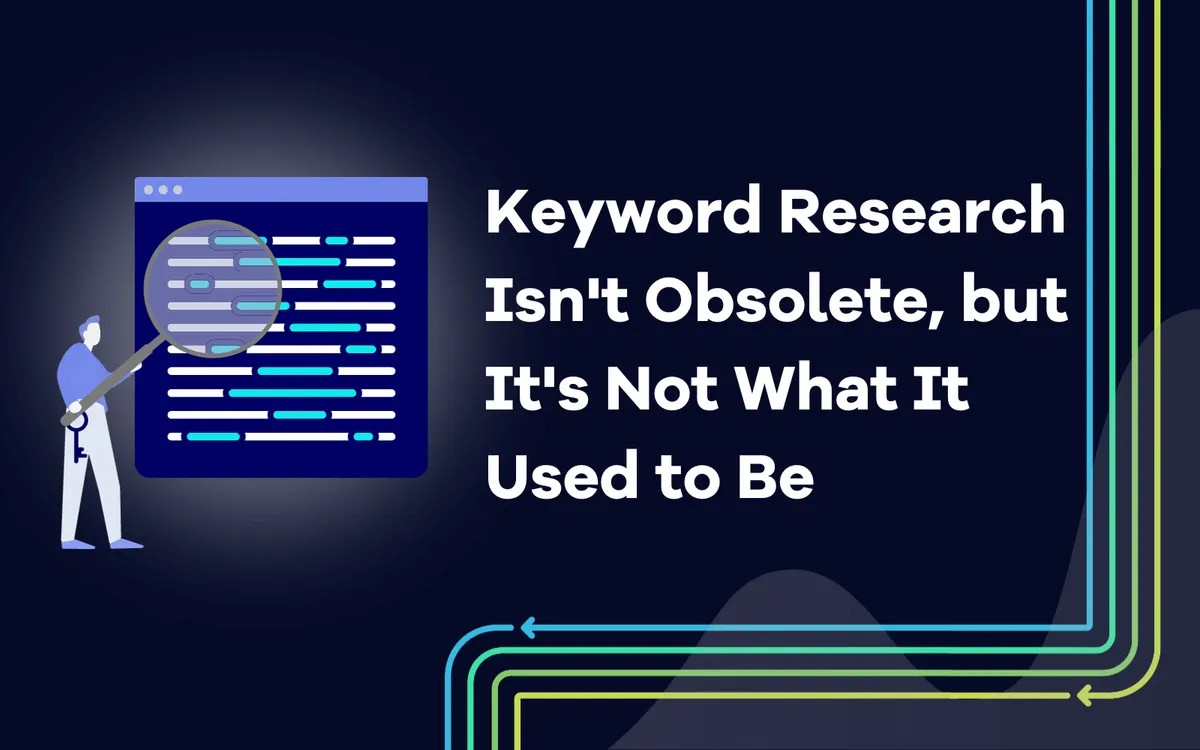
Keyword Research Isn't Obsolete, but It's Not What It Used to Be

Timothy Carter
September 18, 2023
Discover why keyword research remains relevant in the ever-evolving digital landscape, despite its changing role in modern SEO strategies

Search marketers are rightfully dependent on objective data and ongoing reporting to do their jobs well. In the marketing world, we need to constantly challenge our assumptions and refine our understanding of users so that we can ultimately produce better content, strategically outcompete our rivals, and maximize our return on investment (ROI).
One of the most important sources of data for search engine optimization (SEO) professionals to use has been keyword data, discovered through the art of keyword research. But these days, keyword research isn't the directional or informational powerhouse that it used to be.
That doesn't mean that keyword research is obsolete, necessarily.
We'd argue that it isn't.
But it's undeniable that keyword research isn't what it used to be.
And if you want your SEO strategy to be successful, you need to incorporate that assumption into your keyword research and SEO planning approaches.
The Slow Decline of Keyword Research
Back in the day, SEO wasn’t exactly white hat – at least, not by today’s standards.
Today, the most successful search marketers on the planet are focused on developing the best content, reaching a niche audience, and being genuinely, qualitatively better than their top rivals.
But 20 or so years ago, SEO was a simple game of manipulation – and keyword research was at the heart of it.
With a couple of keyword research tools, you could quickly generate information on how many people were searching for a specific term, and how many rivals were ranking for that term, so you could figure out the best possible keywords to target. You could generate a list of 20 or 30 target keyword phrases, then begin developing content built around each of those phrases, thus improving your relevance and authority in the eyes of Google's algorithm.
 Source: Seo.co
Source: Seo.coAssuming you had the time and resources to tackle this, and assuming you didn't have any major players standing in your way, this was a clear and straightforward path to success. You could spam onsite posts using the same phrases, over and over, and practically guarantee that you would eventually rank for those phrases.
Over the years, this approach became less and less viable, with Google issuing penalties for keyword stuffing and keyword data becoming less reliable.
A decade ago, it was still a major pillar in the SEO industry.
Today, it’s a shadow of its former self.
So what happened?
Four Big Factors Limiting the Value of Keyword Research
There are four big factors that limit the value of keyword research in the modern era.
1. Semantic search - First, we need to think about the role of semantic search. Originally, Google functioned almost exclusively based on verbatim keywords and phrases. If you searched for a phrase like “best mountain bikes,” you would almost exclusively find results that included this exact phrase or a very close match. But starting around 2013, Google began releasing updates focused on improving semantic parsing of user search queries. Instead of merely looking at the exact phrase, Google attempted to “understand” the search query, presenting results that addressed the search query even if they contain no exact matches or close matches. With semantic search in play, “best mountain bikes” could return pages like “how to choose a mountain bike” or “which mountain bikes are suited for beginners?” Because of this, it's possible to rank for a wide variety of different search queries, even if you pay little to no attention to keywords and keyword phrases.
2. User search intent- On a related note, Google is increasingly focusing on user search intent as the core motivation for its search engine results page (SERP) rankings. Instead of looking for close matches, Google is looking for pages that are most likely to address whatever the user is trying to do. There's a great deal of subjective processing happening in the background, and since we aren't familiar with the intricacies of Google’s ranking algorithm, we can't say exactly what's happening. What we can say is that the importance of keyword data likely pales in comparison to the importance of understanding user search intent. If you can give users what they want to, and do it consistently, keywords are merely A secondary consideration.
3. Misleading data- On top of that, independent studies have confirmed that the data you view related to keywords in Google’s Keyword Planner (and multiple popular SEO tools) isn’t accurate – or might be misleading. Sometimes, the data is completely outdated. Sometimes, it's distorted because of tracking bot traffic. And sometimes, you can generate very different sets of data by using different tools, even if those tools claim to use the same primary sources.
4. The role of authority- Finally, it's important to recognize that even if you had hypothetically perfect keyword optimization, you'd still need to solve the problem of authority. Google needs to view your domain as highly authoritative and trustworthy if it's going to rank. That’s why it’s so important to conduct routine backlink analyses for your domain, so you can figure out how many backlinks you have pointing to your domain, the value of those backlinks, and how to build better backlinks in the future.
Is Keyword Research Obsolete?
Does that mean that keyword research is totally obsolete?
Not necessarily, and for a few main reasons.
· Keyword research isn’t just about keywords. First, keyword research isn't just about finding exact match keywords that you can stuff into the content of your site. It's also about discovering semantically related phrases, studying what your competition is doing, brainstorming potential content topics, and linking different related topics together. Even if you don't use the data itself, the exercise of keyword research can help you plot a superior content strategy – or find a way to get the edge over your top competitors.
· Inaccurate data isn’t useless. We know that Google SERPs and rankings can be volatile. That’s why the Google Grump rating system exists. But we don't use search engine volatility as a way to totally dismiss the value of tracking rankings. Even if your ranking data isn't perfectly accurate in real time, and even if your rankings are disrupted by SERP volatility, it's valuable to track your progress over time. Similarly, just because keyword data isn't always perfectly accurate, and just because the data changes regularly doesn't mean the research is useless.
· LSI data can provide great content ideas. If you start looking into latent semantic indexing (LSI) keyword data, you can get a much better feel for user search intent and come up with amazing content ideas that your audience will actually enjoy. Since good content is still at the heart of any effective SEO strategy, this is arguably one of the greatest advantages of conventional keyword research.
· Competitive research still matters. It's important to understand who your competitors are and how they're ranking, as well as how they're targeting users as part of their SEO strategies. To date, keyword research is still one of the best ways to obtain this data.
How to Use Keyword Research in Modern SEO
How exactly should you be using keyword research in a modern SEO strategy then?
These tips can help you make the most of keyword research without falling victim to its current limitations:
· Review keyword data skeptically. When looking at keyword data from Google, or reports generated by your favorite keyword research tool, always adopt a skeptical mindset. It's extremely unlikely that the numbers you're seeing are perfectly accurate, and even if they are, they're likely to change in the near future. Bake some degree of uncertainty into your baseline assumptions.
· Use multiple sources of research/inspiration. Similarly, you should use multiple sources for your research and to find inspiration for new pieces of content. Instead of exclusively relying on keyword data, you should also visit blogs associated with your top competitors, pay attention to social media influencers in your industry, and even conduct user surveys to plan and produce better material.
· Focus on addressing user search intent. Google’s Quality Rater Guidelines heavily prioritize user intent as a topic for consideration, so you should consider it as well. The vast majority of user intentions fall into one (or more) of four categories: informational, navigational, commercial, or transactional. People are either looking for information, a specific destination, an array of products and services to solve a need, or a specific product or service they're ready to buy. All of your content should be focused on addressing user search intent in some form (if you want it to rank).
· Don’t overinvest in exact match strategies. Finally, scale back any prioritization you might have for exact match strategies. Creating core pages, blog pages, or even links with exact match keywords is probably going to hinder your strategy more than helping it. That doesn’t mean you have to ignore keywords entirely; it just means your core keyword ideas should be more of a “jumping off point” than a true foundation for your content development.
· Continue building up your authority. More trustworthy, high-authority domains have critical advantages over their lower-authority counterparts. Use link building and promotional strategies to support your best content and continue pushing your authority higher.
Nobody is arguing that keyword research needs to be totally abolished. And even if Google continues improving its semantic search capabilities while restricting data transparency, it's unlikely that keyword research will ever become totally irrelevant or useless. What's important is that we collectively recognize the weaknesses and limitations of keyword research in the context of modern SEO – and that we're willing to take measures to mitigate those weaknesses and limitations.
Related blog posts

5 LLM Visibility Metrics You Should Track in 2026
SEO is now both about ranking in search engines and being visible in LLMs. We give you five visibility metrics every SEO should track in 2026.
3 December 2025Is LLM Tracking Relevant for You?
LLM tracking is not just for SEOs. It is also relevant for content teams, agencies, marketing leadership, and communication teams. Learn why here.
26 November 2025
How to Find the Best Prompts to Track for AI Visibility
Do you want to start tracking prompts to optimize your AI visibility? We give you seven practical ways to identify relevant prompts to track in LLMs.
9 November 2025
